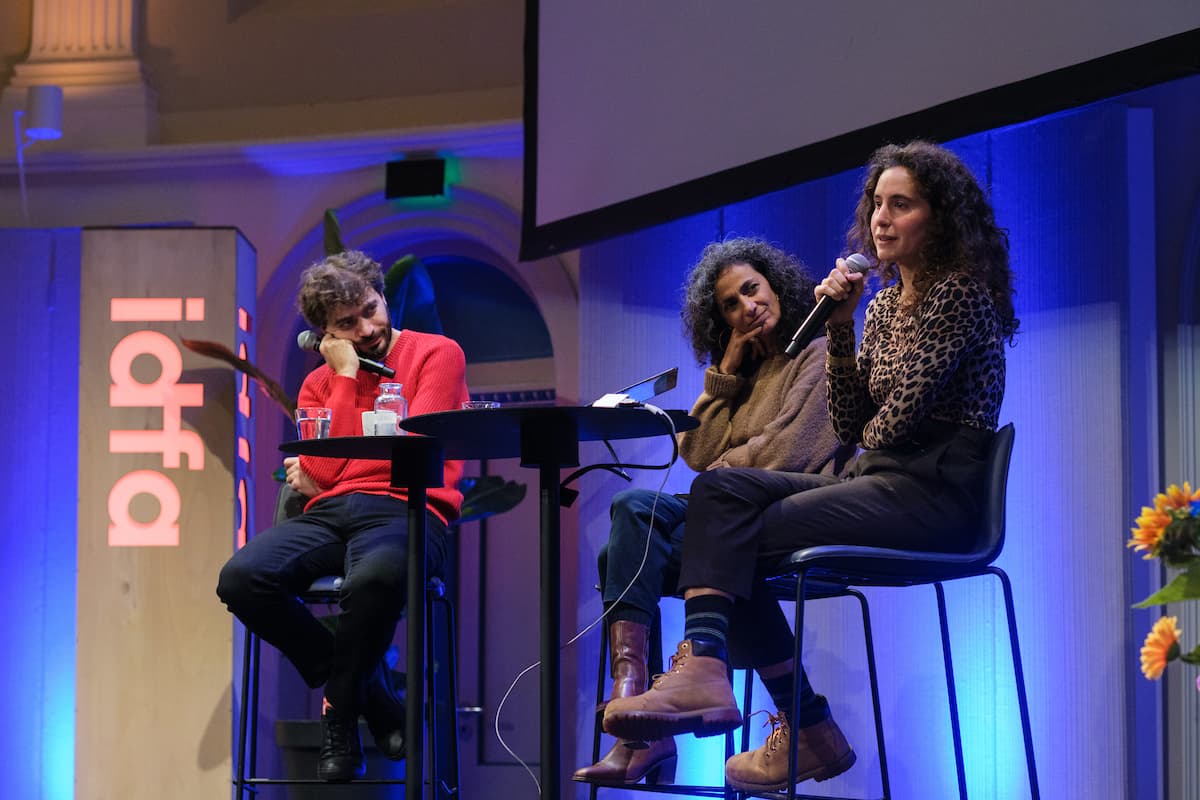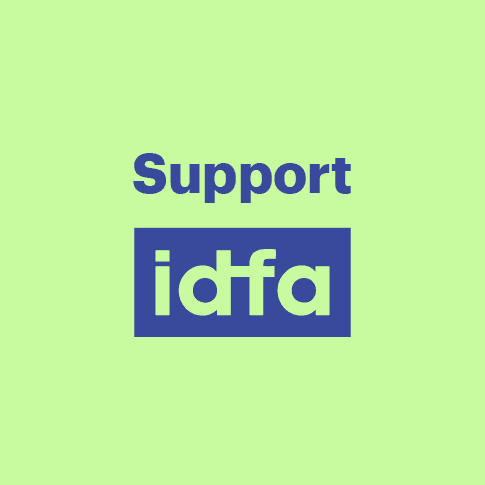
IDFAcademy talk: Constructing the personal narrative
Placing yourself and your family at the center of a documentary film can be fraught with many questions and ambiguity, as you journey into the intimate, complicated, wonderful, and messy stories of your loved ones. This was the oft-repeated sentiment of the IDFAcademy talk: Constructing the personal narrative that took place during the 36th edition of IDFA. During the 90-minute conversation, French-Palestinian-Algerian filmmaker Lina Soualem burrowed into the intricacies of this process with esteemed editor Gladys Joujou, having collaborated with her on the films Their Algeria (2019) and Bye Bye Tiberias (2023). The talk was moderated by director and editor Qutaiba Barhamji.
It was "a vital need to film" that prompted Soualem to commence her first documentary project Their Algeria, featuring her grandparents who had immigrated to France from Algeria in the 1950s. That need to film stemmed from her fear of losing memories, of seeing the generation disappear without them being able to pass on their stories. The act of filming thus became an attempt for the filmmaker to grasp these memories "before they fall into oblivion."
When Soualem met Joujou, she had already started filming Their Algeria. Staying with her elderly grandparents, Aïcha and Mabrouk, who separated after 62 years of marriage gave the filmmaker freedom to be very spontaneous in filming them, as she followed the slow daily rhythm of their lives. However, it was a challenge for the first-time documentary director to break through the silence that reigned over her grandparents' lives. The endeavor seemed especially challenging when filming her grandfather, "the character of silence", who repeatedly brushed off her questions with a deep sigh or a succinct "that is in the past." As Soualem pointed out, she did not yet have the tools at the time as the first-time director "to stage a character in the documentary, to put them back in the [lived] situations, and to reactivate their emotions and memories."
A historical narrative is not a mere recall of facts when its production is filled with charged silences that are rooted in the history of colonization. The filmmaker seemed to concur with this perspective in her treatment of silence while filming her grandfather. His silence thus, in her view, was not necessarily a trait of character but one of many casualties of colonization and displacement. With the urging of Joujou, Soualem turned to various directorial means to help her grandparents reactivate their recollections that had laid dormant for some four decades: from bringing them to a physical place of their memories—be it the old house they had shared or the knife factory where Mabrouk had worked as a young man in the 1950s—through to transporting them to their village back home via photographs.
The divorce of her grandparents at age 80 triggered Soualem's desire to film them, yet it soon morphed into a broader exploration of their story of immigration. It was as if their recent separation from one another led her back to their first separation and the uprooting from their homeland. Through her family archives—captured by her father, the well-known actor Zinedine Soualem—the filmmaker further reflected on and gave visual life to some of the personal and collective memories of Algerian immigrants in France, such as her grandparents, and their own Algeria that they recreated at the time, carrying along the remnants of tradition from their villages.
During the talk, Soualem also touched on other difficulties and successes of making a personal film, recounting her experience of pitching Their Algeria to broadcasters, where some of them questioned the universality of the story set in the Algerian context. Soualem refused to fall into what she referred to as the Western view of what was deemed universal, noting, "Many were telling me that this story was not universal. Why? Because it was about the Algerian grandparents? If it were about the Italian grandparents, for example, everyone would think it would be so interesting and funny that they separated at age 80. But because it was about the Algerian grandparents, the universality is questioned. What is more universal than family?"
Coalescing various anecdotes from the making of Their Algeria with her film Bye Bye Tiberias, Soualem underlined the significance of recalling and bringing together narratives that have shaped our personal and collective histories and have informed our present. "The difference between both films, I would say, is that in Their Algeria, my family was silent, and they were not able to transmit their story because of the colonial trauma," the director said. "While on the Palestinian side of my family [as explored in Bye Bye Tiberias], they transmitted their stories to survive. They survive through storytelling. But there is also fear of these stories falling into oblivion because they are not recognized. The mission of the second film was to gather all these dispersed and fragmented memories and stories and be able to create a narration that allows them to live in one territory, in one narrative."
To make such a fragmented, multi-layered story work in Bye Bye Tiberias, it was important for Soualem and Joujou not only "to write with reality" but also to build a film language that merged several layers of narration, recounting decades of family stories with rich emotional detail. Joujou described it as "a process of finding meanings", where by the end of it the filmmaker hopefully arrived at where they had wanted to be. For Soualem, it was a long-winded and taxing, yet rewarding process of being able to construct and deconstruct the multitude of narratives shaping her maternal family history in Palestine, while accepting its complexity.
To use her own voice-over as a common thread that could weave all these narratives together was not an immediate choice for Soualem. That decision came rather late in the process. "It was a big challenge to put yourself out there," the filmmaker said. "But I understood that it was needed, and this is when we started writing the voice-over, in the last three weeks of editing. We spent more time thinking we were writers and poets [...]. We would read poems and write before actually putting the voice-over in the images [...]. We were reading Edward Said, we were reading Fanon, among others, and trying to grasp in words the feeling of exile, uprooting, and belonging."
In a bid to develop the film language that propels the story forward, Soualem and Joujou also turned to reenactments as a cinematic means, not merely to reconstruct the past events, but to emotionally situate the director’s mother Hiam Abbass—who had left her native village of Deir Hanna to become an actress—back in time, despite all the protective walls she had built up "around those moments." As the filmmaker zeroed in on her mother's departure from Galilee and the rupture that ensued within their family, she also traced the stories of the other women in the family, whose paths remained intertwined.
The film opens and closes with a view on Lake Tiberias, a place of significance for the filmmaker's family, as they revisit the site in the flesh and in memories throughout different periods of time. "It is also a metaphor for our relationship to the place," Soualem said. "Some of us are able to go back. Others haven’t been able to. Every time we go, it's a different way of being there because we don't belong to the place anymore. There are no Palestinians living in Tiberias, and the houses don't exist anymore. But still we go there, so we are there without being there."
